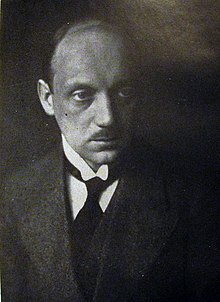Georg Kaiser

Friedrich Carl Georg Kaiser,calledGeorg Kaiser,(25 November 1878 – 4 June 1945) was a German dramatist.
Biography
[edit]Kaiser was born inMagdeburg.
He was highly prolific and wrote in a number of different styles. AnExpressionistdramatist, he was, along withGerhart Hauptmann,the most frequently performed playwright of theWeimar Republic.[1]Georg Kaiser's plays includeThe Burghers of Calais(1913),From Morning to Midnight(1912), and a trilogy, comprisingThe Coral(1917),Gas(1918),Gas II(1920).
He died inAscona,Switzerland, and was buried inMorcotenearLugano.
Work
[edit]The Burghers of Calais(Die Bürger von Calais), written in 1913, was not performed until 1917. It was Kaiser's first success.[1]The play is very dense linguistically, with itsdialoguecomprising numerous emotivemonologuesinfluenced by the Telegramstil poetics ofAugust Stramm.Like Kaiser's other works of the period, it bears the mark ofFriedrich Nietzsche's philosophy, calling upon the modern individual to transcend mediocrity through extraordinary actions; the Expressionist 'New Man' became a commonplace of the genre.
From Morn to Midnight,filmed byKarlheinz Martinin 1920, was written in 1912 and first performed in 1917. One of the most frequently performed works of German Expressionist theatre, its plot concerns a Cashier (played byErnst Deutschin Martin's film) in a small bank in W. (ostensiblyWeimar) who is alerted to the power of money by the visit of a rich Italian lady. He embezzles 60,000 Marks and absconds to B. (Berlin) where he attempts to find transcendent experiences in sport, romance and religion, only to be ultimately frustrated.
Kaiser's classic Expressionist plays, written just before and duringWorld War I,often called for man to make a decisive break with the past, rejuvenating contemporary society. He eschewed characterization, and particularly character psychology, instead making his protagonists and other charactersarchetypes,employing highly anti-naturalisticdialogue often comprising lengthy individual speeches.
Kaiser's dramaSide by Side(Nebeneinander,1923), a 'people's play' (Volksstück), premiered in Berlin on 3 November 1923, directed byBerthold ViertelwithdesignbyGeorge Grosz.With this play Kaiser moved away from the Expressionism of his previous works. Utilizing a more rounded characterization and more realistic curt, comic dialogue to tell a light-hearted story of an idealistic pawnbroker caught up in thehyperinflation[broken anchor]afflicting Germany at the time (the currency stabilization came a fortnight after the play opened), the play inaugurated the 'new sobriety' (Neue Sachlichkeit) in the drama. "Kaiser has left the cloud that used to surround him," a review in theWeltbühnesuggested, "and landed with both feet on the earth."[2][1]
Kaiser's plays, particularlyFrom Morning to Midnight,were highly influential on the German dramatists operating during the 1920s, includingIwan Goll,Ernst TollerandBertolt Brecht,who drew on Kaiser's use of revue-type scenes and parable, which was influenced by medieval and 16th-century Germanmystery plays.
Kaiser collaborated with the composerKurt Weillon his one-act operasDer Protagonist(1926) andDer Zar lässt sich photographieren(1928), alsoDer Silbersee(1933).
In his later years, he further developed his criticism of the modern machine age that had characterised theGastrilogy. Imprisoned briefly in 1923 for stealing a loaf of bread during the hyper-inflationary crisis, Kaiser fled toSwitzerlandwhen theNaziscame to power in the 1930s (Kaiser went into exile in 1938). There he turned to writing verse dramas on mythological themes, includingPygmalion,Amphitryon,andBellerophon,and a pacifist drama,The Soldier Tanaka(1940).
The Raft of the Medusa(1945) is a play written in verse that reverses the ethos ofThe Burghers of Calaisin a more pessimistic direction; to avoid bad luck, thirteen children on a life-raft drown the youngest of them.[1](See thefrigateMédusefor the historical shipwreck andThe Raft of the Medusafor its famous depiction in art.)
Plays
[edit]- 1912:Von Morgens bis Mitternachts(From Morning to Midnight,written; first performed 1917)
- 1914:Die Bürger von Calais(The Burghers of Calais)
- 1917:Die Koralle
- 1918:Gas I
- 1920:Gas II
- 1923:Gilles und Johanna
- 1928:Oktobertag
- 1938:Die Gärtner von Toulouse
- 1940:Alain und Elise[3]
Selected filmography
[edit]Film adaptations
[edit]- From Morn to Midnight(dir.Karlheinz Martin,1920) — based on the playFrom Morning to Midnight
- Women's Sacrifice(dir.Karl Grune,1922) — based on the playDas Frauenopfer
- The Farmer from Texas(dir.Joe May,1925) — based on the playKolportage
- Hurrah! I Live!(dir.Wilhelm Thiele,1928) — based on the playDer mutige Seefahrer
- Zwei Krawatten(dir.Felix Basch,1930) — based on the playZwei Krawatten
- The Valiant Navigator(dir.Hans Deppe,1935) — based on the playDer mutige Seefahrer
- The Ghost Comes Home(dir.Wilhelm Thiele,USA, 1940) — based on the playDer mutige Seefahrer
- Die Frau am Weg(dir.Eduard von Borsody,1948) — based on the storyDer Flüchtling
- Kolportage(dir.Hans Lietzau,1957, TV film) — based on the playKolportage
- Napoleon in New Orleans(dir.Imo Moszkowicz,1959, TV film) — based on the playNapoleon in New Orleans
- Papiermühle(dir.Hans Dieter Schwarze,1962, TV film) — based on the playPapiermühle
- Kolportage(dir.Hans Jaray,Erich Neuberg,1964, TV film) — based on the playKolportage
- Der Gärtner von Toulouse(dir.Falk Harnack,1965, TV film) — based on the playDer Gärtner von Toulouse
- Kolportage(dir.Wilhelm Semmelroth,1968, TV film) — based on the playKolportage
- Kolportage(dir.Peter Weck,1980, TV film) — based on the playKolportage
Screenwriter
[edit]- Devoted Artists(dir.Erik Lund,1919)
- Prince Cuckoo(dir.Paul Leni,1919) — based on the novelPrinz KuckuckbyOtto Julius Bierbaum
- The Golden Lie(dir.Erik Lund,1919)
- Alfred von Ingelheim's Dramatic Life(dir.Erik Lund,1921) — based on the novelAlfred von Ingelheims LebensdramabyHans Land
- The Conspiracy in Genoa(dir.Paul Leni,1921) — based on the playFiescobyFriedrich Schiller
Notes
[edit]- ^abcdBanham 1995.
- ^Willett 1996,p. 85.
- ^"Georg Kaiser: German Dramatisist".britannica.com.Encyclopædia Britannica.Retrieved22 September2016.
References
[edit]- Frank Krause, ed. (2015).Georg Kaiser and Modernity.Göttingen: V&R unipress. ISBN 3-89971-245-5
- Banham, Martin, ed. (1995). "Kaiser, Georg".The Cambridge Guide to Theatre.Cambridge: Cambridge University Press. p.585.ISBN978-0-521-43437-9.
- Willett, John(1996) [1978].Art and Politics in the Weimar Period: The New Sobriety 1917–1933.New York: Da Capo Press.ISBN978-0-306-80724-4.
